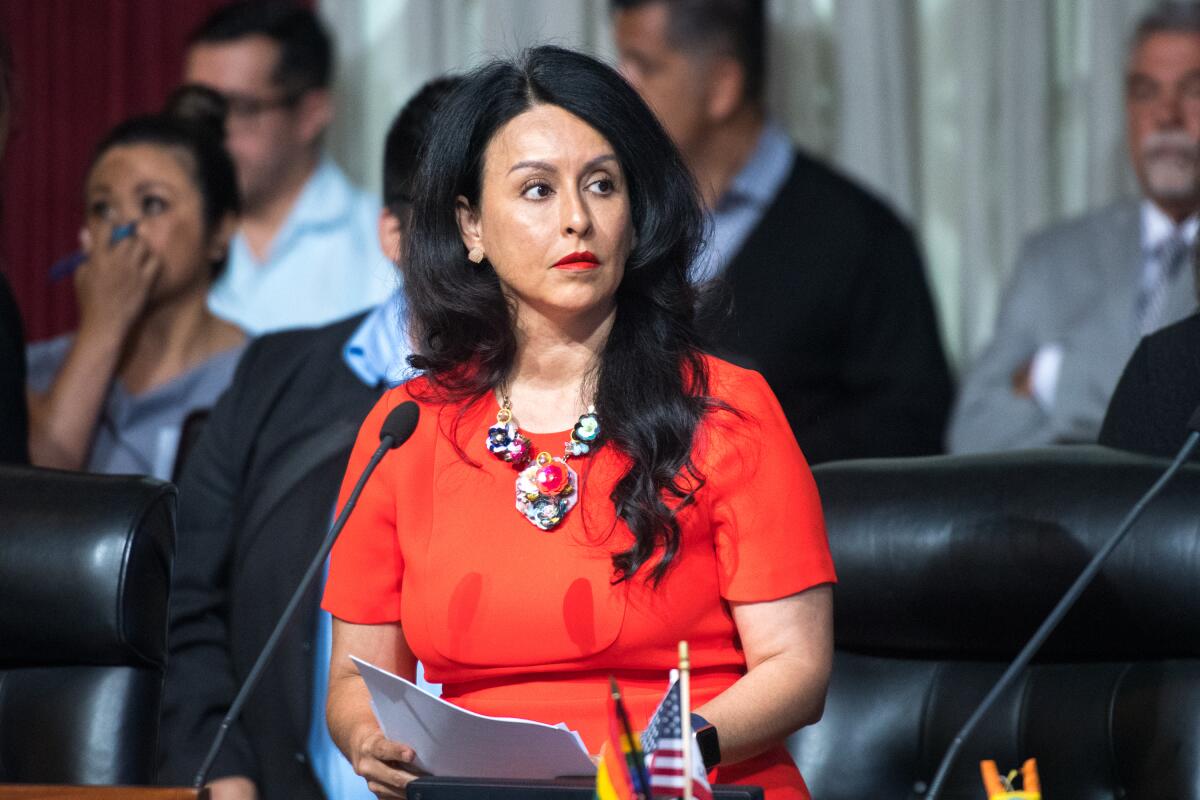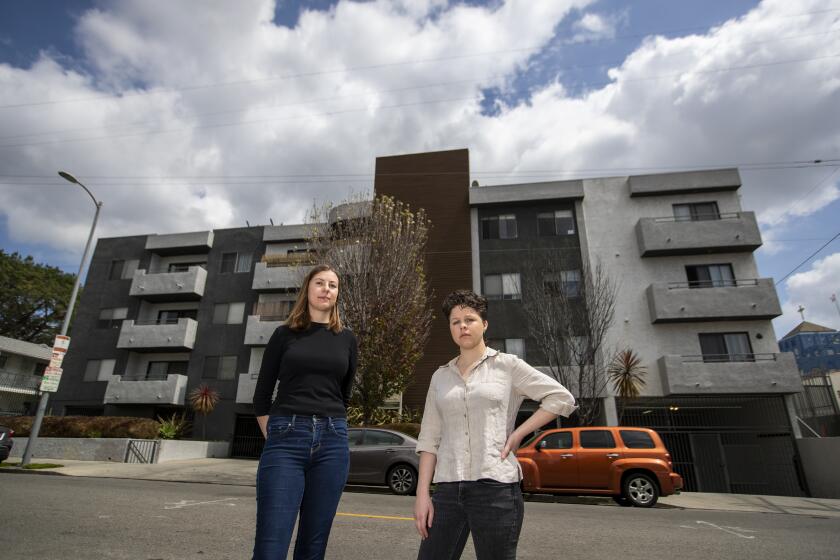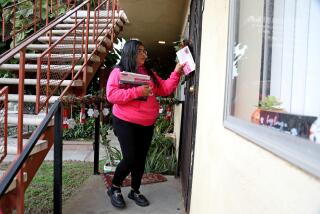L.A. council members push for rent relief and a jobs program to help with coronavirus recovery

Renters who are struggling financially during the COVID-19 pandemic could get help from the city under an assistance program that Los Angeles City Council President Nury Martinez wants to revive and fund.
L.A. launched an “emergency renters relief” program last year as tenants complained of big increases just before a new law limiting rent hikes went into effect, providing payments for up to three months to help cushion the economic blow. In the face of the coronavirus crisis, Martinez wants to reinstate that program and get it running before the end of the emergency period.
Under a proposal introduced Tuesday, the council president would allocate $1 million from discretionary funds controlled by her office, Councilman Herb Wesson would contribute $150,000 from his discretionary funds, and the housing department would be asked to drum up other money for the program.
Wesson and Martinez also want to use federal stimulus money to establish a jobs program that would employ Angelenos once the immediate threat of COVID-19 has diminished, putting them to work on infrastructure projects, including rehabilitating abandoned or substandard housing, improving parks, and building more affordable housing.
“Federal stimulus dollars could be utilized to create jobs for unemployed individuals in the communities where they live instead of offering public relief to large businesses and corporations,” the two wrote in a motion introduced Tuesday.
The focus, Martinez and Wesson said in a statement ahead of the vote, would be bringing “economic and environmental justice to historically disadvantaged communities.” In a motion, they asked for city staffers to report back on creating such a program.
Council members also unveiled several other proposals Tuesday meant to help Angelenos weather the economic effects of the pandemic: Councilman Paul Koretz wants to extend the deadline for tenants affected by COVID-19 to inform their landlords that they cannot pay April rent. Councilwoman Monica Rodriguez put forward a motion seeking to halt debt collection during the emergency period.
And Councilmen David Ryu and Mike Bonin released a proposal to stop rent increases in all apartments, not just those covered by the Rent Stabilization Ordinance, for which Mayor Eric Garcetti has already moved to halt rent hikes.
Ryu and Bonin are also renewing their push for a broader ban on evictions, which would go farther than the restrictions passed to date. The councilmen argued in their motion that “the holes in the eviction protections will allow many Angelenos to be kicked out of their homes during this public health and economic emergency.”
The council has already voted to bar landlords from evicting people who have been affected by the coronavirus, but tenant advocates argue that the existing restrictions are bureaucratic, confusing and don’t go far enough to help renters, especially those who have little paperwork to prove that their financial woes are related to the coronavirus pandemic.
Landlords in Los Angeles are pushing tenants to agree to repayment plans far more onerous than what’s required under new laws passed to prevent evictions.
Local activists from groups that include the Los Angeles Tenants Union and Ground Game L.A. have also been demanding that the city suspend and forgive rent payments. As it stands, tenants must repay their landlords for any rent that they owe within a year — a requirement that activists argue will be too hard for impoverished renters to meet.
Elena Popp, executive director of the Eviction Defense Network, argued that many renters are living so close to poverty that they will be unable to catch up after the crisis. “Unless we get further relief — including rent forgiveness and mortgage relief — we will find ourselves facing huge numbers of evictions in a year,” Popp said.
In the last week, progressive activists have held drive-by protests outside the homes of Garcetti, Martinez and Councilmen Mitch O’Farrell and Paul Krekorian, shouting and honking their horns.
Martinez and O’Farrell voted against an earlier push for a blanket ban on evictions last month; Krekorian abstained because he owns rental property in L.A.
“Folks shouldn’t be having to choose between food or rent during a pandemic,” said Carmina Calderon, a member of the Healthy LA Coalition pushing for more action to help tenants, workers and homeless people, during Tuesday‘s meeting.
Bonin and Ryu’s motion seeks an emergency ordinance that prohibits any landlord from serving a notice to evict a residential tenant, “except to protect the health and safety of other occupants of the property.” It is unclear when the council will vote on that motion, which is similar to the proposal that was narrowly voted down by the council last month.
“A complete ban on evictions would merely turn up the heat on mortgage defaults and place housing providers in more financial distress than already exists,” Daniel Yukelson, executive director of the Apartment Assn. of Greater Los Angeles, said in an email. Bonin and Ryu “have conceived this concept of virtually ‘no evictions’ to pander for votes from the city’s renters knowing that for the next few months, the courts are, in effect, closed for hearing eviction cases.”
On Monday, the state court system froze almost all eviction and foreclosure proceedings across California, making it nearly impossible for newly struggling tenants and property owners to lose their homes for the duration of the public health crisis. Under the decision by the Judicial Council, the policy-making arm of the court system, eviction cases won’t move forward until three months after the state of emergency related to the coronavirus ends.
But landlords are still allowed to initiate cases and slap eviction notices on their tenants’ doors. Activists said they were worried that landlords could continue to do so to intimidate renters.
At the end of the meeting, Koretz covered his nose and mouth with a bandanna and pushed for an emergency ordinance to require Angelenos to wear facial coverings whenever they leave their homes — although he stressed that there would be no punishment for failing to do so, calling it “self-enforcing.”
Amid concerns about access to masks, a majority of council members balked at pushing forward the plan as an emergency measure Tuesday, instead referring the idea to a committee.
Times staff writer Liam Dillon contributed to this report.
More to Read
Sign up for Essential California
The most important California stories and recommendations in your inbox every morning.
You may occasionally receive promotional content from the Los Angeles Times.











